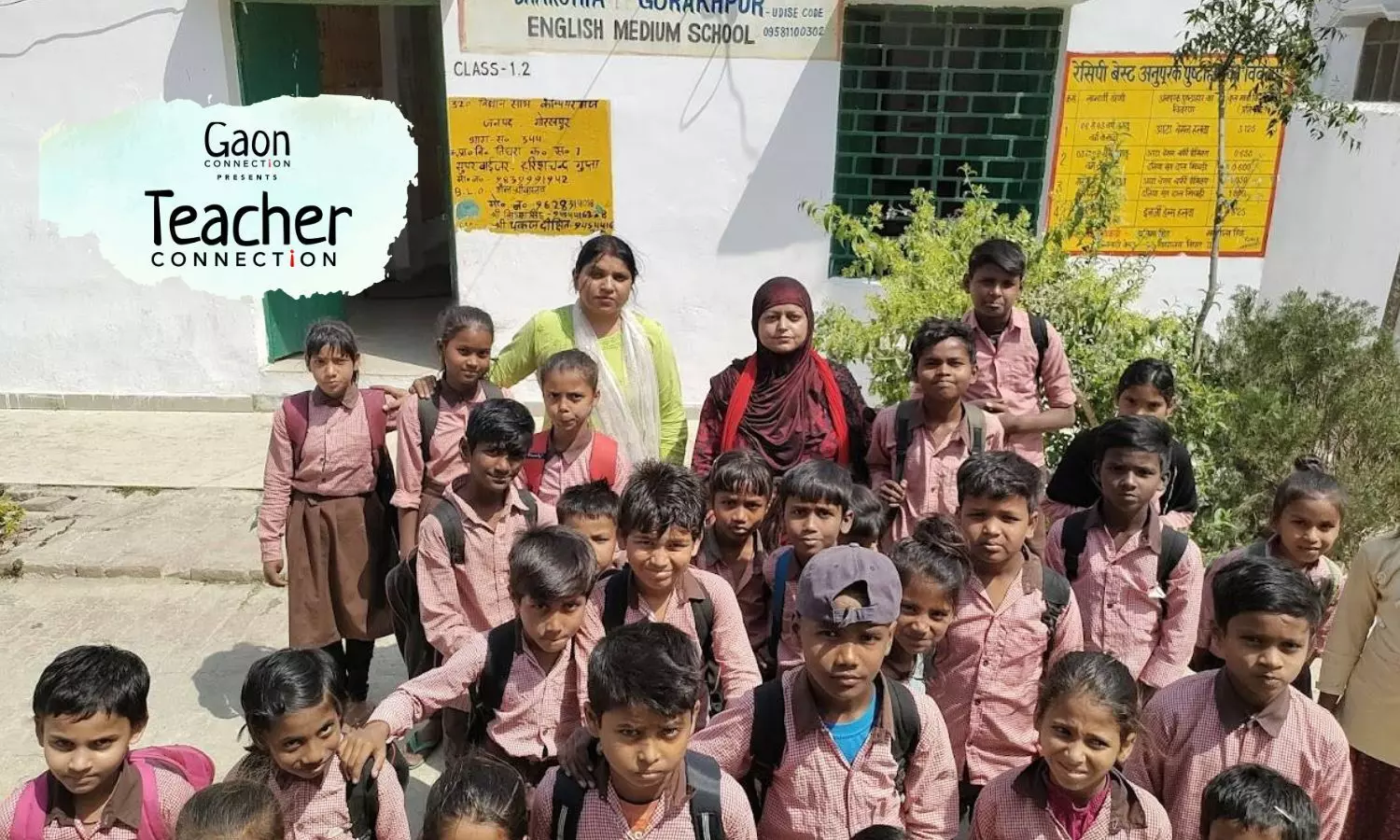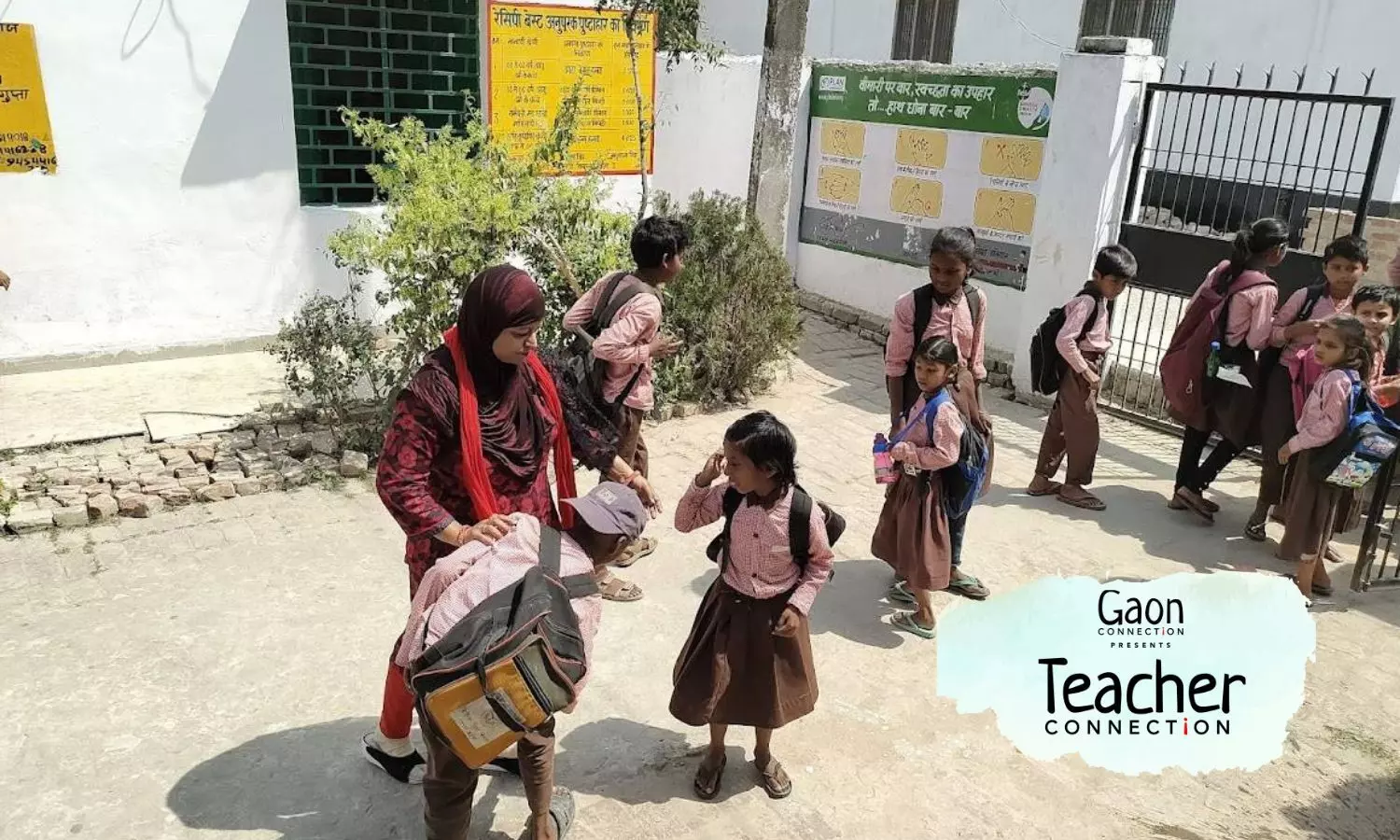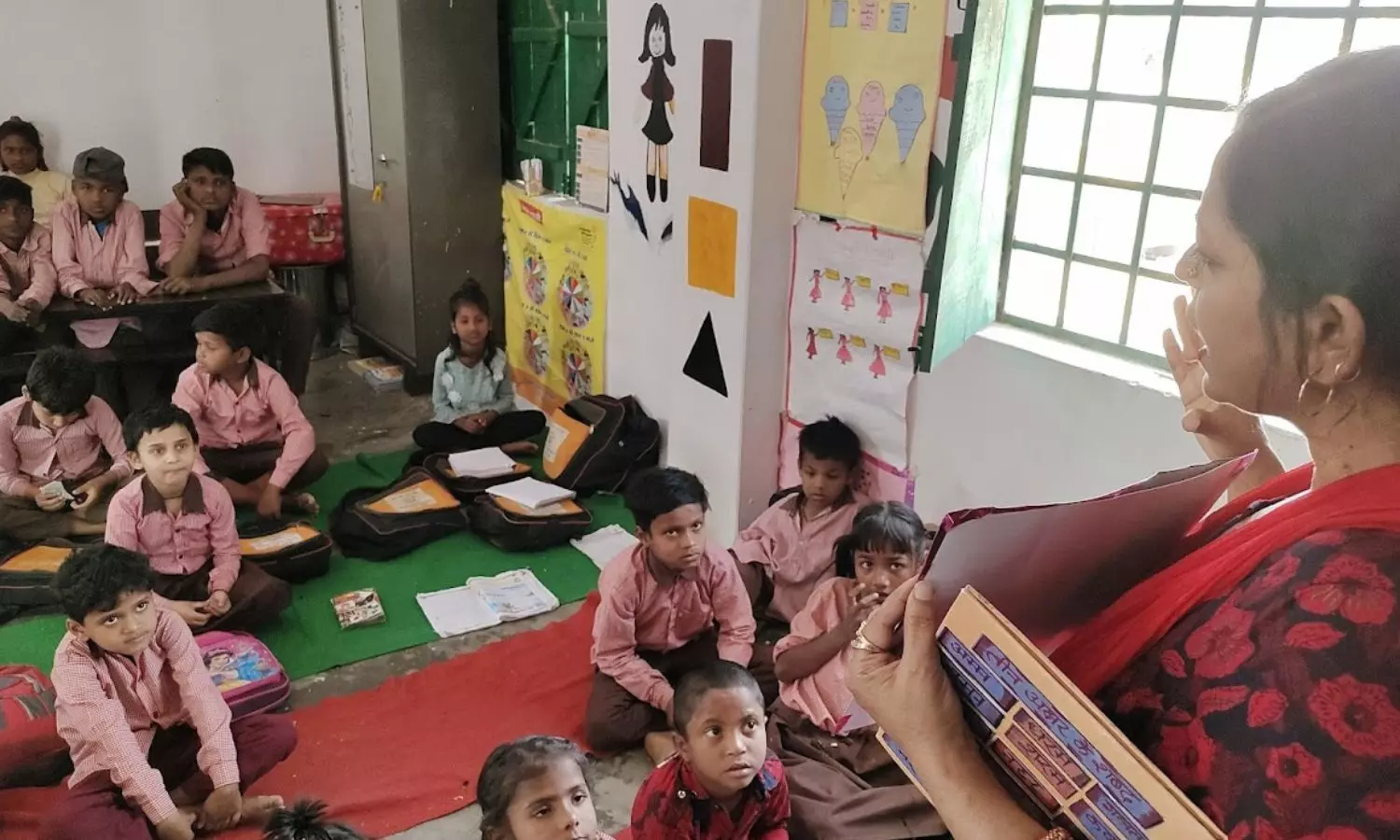Tighra Dwitya (Gorakhpur), Uttar Pradesh
The only sound in the classroom is that of rustling as the students turn the pages of their workbooks. Heads bent, fingers busy writing, the 55 children in Roshan Jahan’s class are busy.
Every now and then the class leader Simran, a nine-year-old student, surveys the classroom and if she finds anyone struggling with the classwork, she goes over to help with the exercises in the workbook.
Roshan Jahan says the workbooks are a godsend. “They are provided by the education department and in a multi-grade, multi-level classroom like ours, they keep the children gainfully occupied if we are called out of class for some administrative work,” Jahan told Gaon Connection.
Jahan has been teaching at the government primary school in Tigra Dwitya village of Gorakhpur district in Uttar Pradesh since 2008. The primary school has just two teachers, Roshan Jahan and Ruchi Upadhyay, and two functional classrooms to manage 111 children from classes one to five. While Jahan teaches bhasha (language), Upadhyay teaches mathematics to the students from classes one to five.
Also Read: A planned move to bring out the best in the classroom

Every month, these ministers hold Baal Sansad, a ‘parliamentary’ session where they discuss the progress of their ministerial tasks
Multi-grade, multi-level classroom management is not easy, said Roshan Jahan who joined the school as a teacher in 2008 and was promoted to the post of a headmistress of the school in 2014.
“Teachers, even if we are just a handful, are often called upon to do outside-the-classroom-work, such as updating digital records, DBT transfers, conducting surveys and so on. We are forced to leave the class unattended. In such a situation, the workbooks step in for us,” she smiled.
Jahan instructs her students to solve the problems given in the workbooks before she leaves the classroom. “These books are interactive and the children can be kept engaged for 40 minutes without the supervision of a teacher,” Jahan said.
Also Read: Creating a level playing field in the classroom
The workbooks are part of the study material provided by the state’s education department. Teachers in multi-grade, multi-level classrooms are finding them of immense help in aiding the students in their learning outcome. These workbooks also allow the teachers to fulfil their additional administrative responsibilities, without having to worry about their students being without supervision in classroom.
The children on their part know the drill well.
“We have practised this drill several times. We know that when Roshan madam is busy, we have to cooperate with each other. We have our assigned groups in the class and together we get on with our workbooks,” Simran, told Gaon Connection.
“When I explain concepts that have been taught to us by Roshan madam, to students who are struggling to understand them, my own understanding of the subject gets better,” she told Gaon Connection.
Designating responsibilities to the students is recommended by the NIPUN (National Initiative for Proficiency in Reading with Understanding and Numeracy) programme, which was launched in July, 2021, by the Union Ministry of Education. This is especially useful in schools where there are multi grade, multi-level classrooms. A multi-grade, multi-level classroom is where students from several classes sit in the same classroom and has just a single teacher teaching them simultaneously.
Also Read: She travelled from Mumbai to a remote village in Kargil to find a purpose in life — Teaching

The workbooks allow the teachers to fulfil their additional administrative responsibilities, without having to worry about their students being without supervision in classroom.
“The students of each grade sit in separate groups. If I am teaching the students of class three, I make sure the students of classes one and two are revising what has already been taught to them,” explained Jahan. Jahan also makes the different groups write mock tests while she is teaching other groups. “This also helps them understand concepts better,” she said.
Jahan said that using audio-visual content as a teaching aid is also a great help. While one or two groups of students watch that, she moves on to the other group in the classroom to teach them something else.
“It is sometimes cumbersome to handle so many things at the same time, but now with years of practice, I can say that I am conducting classes in an efficient manner,” said the primary teacher.
Also Read: A former IAS officer creates level playing fields for underprivileged civil service aspirants
Multi-tasking
The maths teacher, Upadhyay also follows suit. “As soon as I know I am required to be out of the classroom, I tell the students, and they know what to do. I have made them rehearse the drill a hundred times,” the assistant teacher smiled. The children immediately take out their workbooks and get cracking on them, she said.
A lot of innovation is needed in multi-grade, multi-level classroom teaching, but there are a lot of positive spin offs too, Jahan said. “Delegating responsibility to the students makes them confident, even those who are introverts and shy,” she pointed out.
She gave the example of Kanak, a class two student, who was reserved, barely spoke and did not engage with either the teacher or the class at all.

Jahan instructs her students to solve the problems given in the workbooks before she leaves the classroom.
“But I could tell she grasped things quickly. So, I made her a group leader and now it was her responsibility to explain concepts she understood so well to those who hadn’t,” Jahan said. Kanak positively bloomed after this, she added.
Ministerial Portfolios, Children’s Parliament
“We have identified fast learners in the class and they are appointed as ministers for ministries of library, water, culture, education and health. There is also a prime minister who oversees all these ministers,” Jahan told Gaon Connection.
“This has not only resulted in the rise in the confidence levels of these students but it has also made my classes more efficient. These ministers report to me about issues in their respective portfolios and I then act accordingly. It saves me time I would otherwise spend micromanaging these issues in the class,” the principal said.
“If the nails of any students are overgrown, I write down their names and give it to Roshan madam,” Ankita Gaur, a student of class three who is the minister of health, told Gaon Connection. This way, Ankita ensures the students in the school are well turned out.
Also, every month, these ministers hold Baal Sansad, a ‘parliamentary’ session where they discuss the progress of their ministerial tasks. Their performance is reviewed by the teacher.
“I ensure that the portfolios are rotated. New students are given a chance to lead the various ministries,” Jahan said.
Parents feel a sense of pride watching their children exude confidence. Simran Singh, a student of class 3, was painfully shy when she first came to school. “But now, she is full of confidence and speaks so well. Roshan madam accomplished what I as a mother could not,” Gayatri, the student’s mother, told Gaon Connection. “I often used to worry about Simran. But, not any more. She is in safe hands,” she smiled.




















